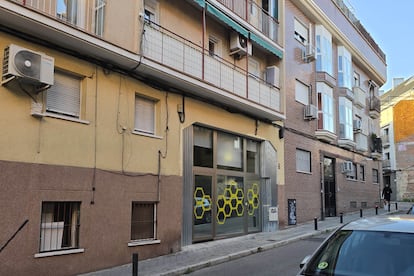Meet the Madrileños who move into Toyko-style capsules when they can’t pay their rent
Sleeping boxes like those in Japan, theoretically designed for backpackers, are being used for long-term stays by professors and students unable to find accessible housing


Gallery Hostel Madrid opened at the end of August as one of those new tourist hotels in which rooms are supplanted by “capsules” mounted one on top of the other like a human storage facility. Ads for these businesses, as well as the media reports that have covered their rise, present them as a “futuristic” alternative, inspired by similar spaces in Tokyo, a megalopolis where every square foot of living space is treasured. Supposedly, the target public of these hives are backpackers and other less demanding travelers, but amid a serious housing crisis in Spain’s capital, it was perhaps only a matter of time before they were inhabited by people unable to find affordable long-term housing.
The receptionist’s name is Eva, a 22-year-old university student who helps customers from behind a counter in a lobby that triples as a dining room and kitchen for guests. She leads a visitor inside, opening the door to a room of about 1,600 square feet that houses 36 capsules, including 24 for a single occupant and 12 doubles. In total, 48 people fit in the space. It’s the middle of the afternoon and the area is silent, and it’s difficult to tell if the wooden, “Nordic style” boxes contain humans. When night falls, the guests arrive. Some, after a day of sightseeing. Others, from work.
Among of the latter group of residents is 57-year-old Luis Miranda, a teacher of hotel management professional training courses. He has just returned from overseeing classes at a nearby school and has his dinner in the dining room: a glass of wine and food from a Tupperware he stored in the refrigerator. He says he arrived the second week of October and pays $27 a night, with breakfast included. He is one of several professors from out of town who spend their workweeks here, returning “home” on weekends. In Miranda’s case, that’s the city of Cáceres, where he lives with his wife and three children. “There is another professional training professor who comes from Germany and has been here a little longer than I have,” he says. “Also, there’s a Complutense University of Madrid fine arts professor who comes from Galicia.”

Thierry overhears the conversation from another table. He says he is a Congolese diplomat studying for his doctorate at Madrid’s Carlos III University. He paid the monthly rate through mid-December. “I looked for a flat and I realized that to rent in Madrid, you have to pay $736 to $842,” says the African student, who is having a salad he prepared for himself for dinner. The hostel is giving him a discounted rate that he prefers not to share.
Thierry, who asks to go by his first name because the subject makes him uncomfortable, found the hotel after a desperate search of the capital’s wild real estate market. When he made his reservation, he didn’t know he was renting a capsule. He found out when he arrived at the site, which is located in Carabanchel, a working-class neighborhood, among narrow streets and 1960s-era buildings of red brick and green awnings. Gallery Hostel stands at 20 Salana de Opañel Street, far from the tourist circuit, more than half an hour by subway from the central Puerta del Sol.
The place is found on the ground floor of a block full of apartment buildings (according to residents, the address had been vacant for more than 15 years) and its owners have affixed single words in English and Spanish to its mirrored façade: “Trabajo,” “Dreams,” “Dormir,” “Shower,” “Descanso.” A hexagonal design is the only clue of the hive that lies beyond the front door. Thierry first entered the place, saw the capsules, and decided to stay.
— And how do you like it?
— It’s fine. These days, you can’t expect big spaces.

$452 a month
Capsule hostels are in style. According to various articles, they’ve appeared over the last five years in major Spanish cities like Madrid, Barcelona, Bilbao, and Seville. They allow real estate investors to make more money per square foot than a conventional apartment or Airbnb holding. There’s no lack of clientele who are willing to sleep in a box. Some are curious travelers on a leisure trip. Others are merely there to keep a roof over their heads — or rather, a box.
The problem is that current laws do not permit residential use of hostels. Madrid regulations only allow for temporary stays, typically measured in days. For long-term stays, establishments have to comply with the capital’s zoning guidelines, which outline minimal requirements for a living space: a living-dining room, kitchen, bedroom and bathroom, with a floorspace equal to or greater than 430 square feet, says José María Ezquiaga, former dean of the Madrid College of Architects.
“These regulations have a long history,” he says. “During the post-war period, there were laws to prevent Madrid from being rebuilt with substandard housing.” But despite this, property owners often succumb to the temptation to allow capsules to be used for long-term stays. EL PAÍS has verified that Gallery Hostel offers monthly stays for $452.
There’s not much to do beside sleep in the capsule hostels. Guests have access to an individual locker and a shared bathroom with seven showers. In the common area there is no TV, no music playing. On the walls hang a few modern art paintings, a world map, a bicycle, and neon lights. The ceiling has an industrial feel, with exposed beams, as if the owners were unwilling or unable to disguise the look of barracks.
Miranda usually remains in the dining room after dinner until late. Sometimes, he strikes up a conversation with other guests. On other occasions, he takes out his laptop and corrects exams. On this weeknight, most people have retired to their capsules. Eva goes back to her home in the Madrid suburb of Leganés at 10 p.m. and the place will be unstaffed until 8 a.m., when her coworker arrives for their shift. On certain occasions, if a newcomer arrives or a problem comes up, Miranda takes care of it.
A young man comes in who is following check-in instructions on his phone. He clearly sees the experience as an adventure. He enters in a code to open the front door, accesses a lockbox next to the front desk to get a key card, which allows him to open his capsule. He asks for help about what to do next.
— What number do you have?, asks Miranda.
— Capsule eight.
— Look, you open that door and you’ll see some lockers, in case you have to store something.
— Nothing, answers the young man, who is arriving empty-handed.
— Then go inside and you’ll see the capsules. Look for yours and swipe the card.
— I like this because it’s like an escape room!
Miranda says that the capsules aren’t for everyone. “A couple days ago, a guy got overwhelmed and left.” The compartments measure six-and-a-half feet lengthwise and are a little over three feet wide and three feet high. They include a mattress, a blanket, a mirror and a panel of interior light that changes color according to the user’s taste: blue, pink, green, white, or yellow.
Once inside, the occupant can close the sliding wooden door until they hear a click. To exit, they have to press a button. An electronic sound indicates when the lock has been opened. Miranda says that people “are flabbergasted” when he tells them that he is staying in a capsule. “Honestly, I’m comfortable,” he tells them. “The place is comfortable and clean.”
Miranda is working as a substitute professor and doesn’t know how long he’ll stay in Madrid. This option suits him as he can reserve weekly or bi-weekly and it’s cheaper than other shared housing situations in the capital. “There are hostels that charge you $74 to $84 a night,” he says.
He has his own car, and when he returns to Cáceres, he posts the trip on Blablacar. Miranda often has the opportunity to hear the laments of his neighbors, who are bitter over Madrid housing prices. “Everyone, everyone, everyone has roommates. No one has their own apartment. This city is impossible.” After 2 a.m., the hive settles into an absolute silence. He remains in the dining room, correcting exams, illuminated by the screen of his laptop.
Sign up for our weekly newsletter to get more English-language news coverage from EL PAÍS USA Edition
Tu suscripción se está usando en otro dispositivo
¿Quieres añadir otro usuario a tu suscripción?
Si continúas leyendo en este dispositivo, no se podrá leer en el otro.
FlechaTu suscripción se está usando en otro dispositivo y solo puedes acceder a EL PAÍS desde un dispositivo a la vez.
Si quieres compartir tu cuenta, cambia tu suscripción a la modalidad Premium, así podrás añadir otro usuario. Cada uno accederá con su propia cuenta de email, lo que os permitirá personalizar vuestra experiencia en EL PAÍS.
¿Tienes una suscripción de empresa? Accede aquí para contratar más cuentas.
En el caso de no saber quién está usando tu cuenta, te recomendamos cambiar tu contraseña aquí.
Si decides continuar compartiendo tu cuenta, este mensaje se mostrará en tu dispositivo y en el de la otra persona que está usando tu cuenta de forma indefinida, afectando a tu experiencia de lectura. Puedes consultar aquí los términos y condiciones de la suscripción digital.








































